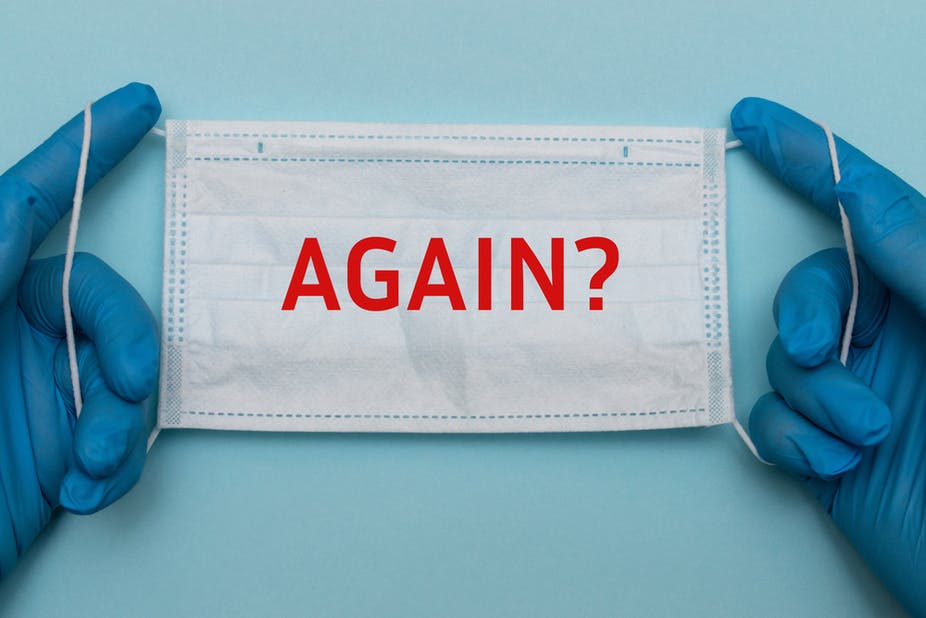
With so many people affected by COVID-19 and an increasing number of people who have been vaccinated, many are wondering if they can be reinfected with COVID-19 after an initial infection or after a vaccine. The short answer is yes — second cases of COVID-19 do occur. However, right now they are rare. Here’s what we currently know about reinfection.
How many people have been reinfected with COVID-19?
It’s hard to say how many people have been reinfected with COVID-19, because you need special testing to determine if you were really reinfected. It’s possible that you could have a COVID-19 infection where you get sick, feel better for a period of time, and then get symptoms again as part of the same infection. This would really be a continuation of the same infection, and not a true reinfection. Also, people can continue to test positive for COVID-19 for many weeks after the initial illness, which can confuse things, too.
To truly determine that a reinfection has occurred, a genetic analysis of the virus from each illness would be needed to prove that the two illnesses were caused by two different COVID-19 infections.
If it’s a number you’re after, a study of people in Denmark showed that of people who had COVID-19 during the first wave of infections in the country, only about 1 in 150 tested positive during the second wave of infections. The people who tested positive twice could have had reinfections, but it’s hard to say for sure because studies like this one don’t always have all the information they need about each case of infection. While this is a small number, keep in mind that COVID-19 is still new to us, and this number might increase as time passes and we learn more about the virus.
Are the symptoms of reinfection the same?
Like most things about COVID-19, we are still learning more about it. When scientists have looked at confirmed cases of reinfection, most cases had similar symptoms and similar severity to the first COVID-19 infection, with some infections being milder and some infections being more serious and potentially life-threatening.
Are you only at risk of reinfection due to new variants of COVID-19?
New variants are a big concern for reinfection. Scientists are finding new variants that your immune system might not recognize. Worse, many of the new variants are more infectious than the initial COVID-19 virus. So there are definitely reasons to be concerned about new variants.
The question of whether you can be reinfected by the same strain of COVID-19, and how likely it is, is up in the air. COVID-19 is a coronavirus, and other types of coronaviruses that infect humans exist, usually causing mild cold-like illnesses. These other types of coronaviruses circulate throughout the population. Once you get infected, you are only immune for a year or two. After that, you can be reinfected.
It’s not clear if the COVID-19 virus will be the same — it will take time for us to know for sure. It’s possible that we will see more cases of reinfection as time passes, because the protective immune response people get after the first infection with COVID-19 might disappear.
If you’re not vaccinated, are you at higher risk of reinfection?
The COVID-19 vaccines are an important part of the fight against the pandemic. They are 85% to 95% effective at preventing COVID-19 infections, and you reach full immunity 1 to 4 weeks after you finish your vaccination, depending on which vaccine you get.
So, the vaccines prevent COVID-19 infections. But if you already had COVID, does getting vaccinated help prevent a second COVID-19 infection? We don’t have exact data for this yet because not only are COVID-19 reinfections rare, so are infections after being vaccinated.
The Centers for Disease Control and Prevention’s recommendation is to get the COVID-19 vaccine even if you’ve had an infection, because getting vaccinated creates a stronger immune response than natural immunity. Getting vaccinated can also help protect other vulnerable people who might not get fully protected from a COVID-19 vaccine, because you are less likely to spread COVID-19 to them.
Are new strains of COVID-19 resistant to the current vaccines?
For a lot of the COVID-19 variants that are out there, it looks like being fully vaccinated will protect you from them. However, new variants might arise in the future that could evade the protection provided by current vaccines. There have been cases of COVID-19 infection with new variants after people have been vaccinated, so it’s clearly possible.
Keeping up with booster vaccines when they become available, or future new vaccines that could target multiple parts of the virus, will be important to stay ahead of new COVID variants.
The bottom line
COVID-19 reinfections are rare so far, but possible. We may see more cases of reinfection start to happen after some time passes, as our immune response to the virus and vaccination fades, or because new variants of the virus may appear. Remember that vaccines and other public health measures can go a long way to keep you and others safe, and are still necessary even if you’ve recovered from COVID-19.